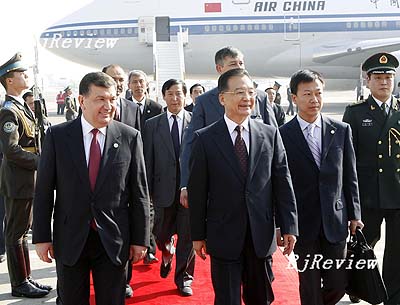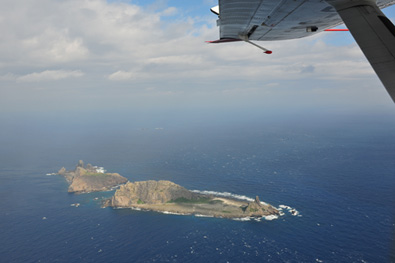|

China and some former Soviet Union republics have caught the world's attention with their high-profile joint antiterrorism initiatives, especially those within the framework of the Shanghai Cooperation Organization (SCO). Their cooperation is not limited to security alone, but covers a wide range of fields from agriculture to telecommunications. Chinese Premier Wen Jiabao's recent trip to Uzbekistan, Turkmenistan, Belarus and Russia has injected new vigor into China's relationships with them.
Wen visited the countries on November 2-6. During the trip, he also attended the sixth SCO prime ministers' meeting in Tashkent, Uzbekistan. In Russia, he attended the closing ceremony of the yearlong program of the "Year of China in Russia" and held a regular meeting with his Russian counterpart Viktor Zubkov, the first since Zubkov took office in September.
"The most prominent achievements of Wen's trip lie in the fields of antiterrorism and energy," said Yang Chuang, a professor specializing in Russian studies at the China Foreign Affairs University. China vowed to strengthen energy cooperation with Uzbekistan and Turkmenistan, he said. Wen's trip also deepened China's consensus with these countries on combating the three evil forces of terrorism, separatism and extremism. The trip's achievements were quite comprehensive, with agreements reached in many different areas, Yang said.
Wen raised a four-point proposal on enhancing SCO cooperation at the SCO prime ministers' meeting on November 2. He proposed feasibility studies on agricultural cooperation, including the development of agricultural technology, information exchange and the processing of farm products. He also called for scientific and technological cooperation among SCO members and suggested that government departments and the business community work together on scientific and technological research, personnel training and the commercialization of research achievements.
At this year's SCO summit in Bishkek, Kyrgyzstan, in August, the heads of state signed a series of important documents, which moved the organization into a new stage of "pragmatic cooperation," said Xu Tao, an expert on SCO studies at the China Institutes of Contemporary International Relations.
The prime ministers' meeting is meant to be a forum on the implementation of the goals put forth at the summit, he said. Discussions on formulating plans on cooperation in the fields of antiterrorism, transportation, energy and culture, setting specific near-term tasks, and promoting the organization's pragmatic cooperation topped the agenda of the Tashkent meeting, he said.
Although Wen regularly attends the annual SCO prime ministers' meeting, his visits to Turkmenistan and Belarus this year have special implications, Yang said. Turkmen President Gurbanguly Berdymukhamedov has inherited his predecessor Saparmyrat Niyazov's friendly policy toward China, he said. As a major energy producer in Central Asia, Turkmenistan benefits from strengthened cooperation with China, he said.
During Wen's visit, China and Uzbekistan issued a joint communiqué, pledging further efforts to strengthen bilateral relations in various fields. The two countries promised to raise their two-way trade volume to $1.5 billion by 2010. They also agreed to restore and put into operation a road connecting China, Kyrgyzstan and Uzbekistan at an early date. China will encourage Chinese companies to import more cotton directly from Uzbekistan.
China and Turkmenistan signed a natural gas supply contract in July during Berdymukhamedov's visit to China. Under the contract, China National Petroleum Corporation, the largest Chinese oil producer, will import from Turkmenistan 30 billion cubic meters of natural gas annually through the planned Central Asia Gas Pipeline for 30 years. In a meeting with Wen, Berdymukhamedov said the Turkmenistan would work closely with its Chinese partners on implementing the natural gas pipeline project.
In the joint communiqué issued by China and Belarus, the two countries vowed to offer mutual support over issues that bear on their core interests. The two countries agreed to promote bilateral cooperation in large-scale projects and raise the level of their economic and technological cooperation. China will encourage its enterprises to invest and conduct trade cooperation in Belarus. Exchanges in science and technology, education, culture, health care, sports and tourism and cooperation between local regions of the two countries will also be strengthened.
China and Russia have boosted their cooperation in recent years, Yang said. Notably, they have reached an agreement to strengthen provincial cooperation between the five provinces and autonomous regions in north China-Xinjiang, Inner Mongolia, Heilongjiang, Jilin and Liaoning-and the Russian Far East. The two countries have plans to build cross-border roads and railways, he added.
After Wen and Zubkov held their meeting on November 6, nine agreements were signed, including a joint communiqué. Of the agreements, four concern their cooperation on the peaceful use of nuclear power. The two countries also agreed to complete the construction of an oil pipeline connecting China and Russia by the end of 2008.
Yang believes all these measures will help the two countries realize the goal of raising their bilateral trade volume, which stood at $33.4 billion last year, to $60 billion-$80 billion by 2010.
|
China-Uzbekistan Relations
China and Uzbekistan have tightened their ties since they established diplomatic relations in 1992. The treaty on their friendly and cooperative partnership signed in 2005 laid a solid groundwork for the long-term development of the two countries' relations. Today, China and Uzbekistan work together in political, economic and cultural fields and on regional and international issues.
|
|
|
|



